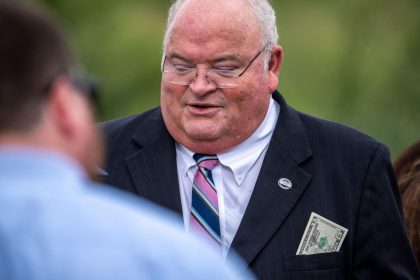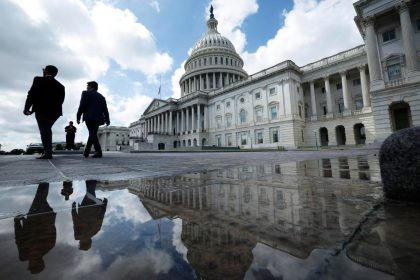This is a published version of our weekly Forbes Tax Breaks newsletter. You can sign-up to get Tax Breaks in your inbox here.
Chances are that you flew or drove somewhere this week. AAA projected that over 70.9 million travelers would head 50 miles or more from home over the Independence Day holiday travel period—of those, a record 60.6 million people will travel by car. One reason? Gas prices are lower than last year when the national average was $3.53.
But that’s not necessarily true everywhere. As of July 1, Illinois residents saw an increase in gas prices as the state implemented a new motor fuel tax rate of 47 cents per gallon—a 3.5% increase. Illinois already has the second highest state gas tax, trailing only California—the July 1 increase puts the Prairie State within four cents of California’s lead rate of 51 cents per gallon.
Also on the rise? The IRS has issued warnings to taxpayers and tax professionals about new scams. With the help of AI, scams are increasingly sophisticated and more convincing to potential victims, and family members often want to help. For those with global financial assets, multinational families, and Americans living abroad, there are significant challenges due to distance and complex U.S. tax laws.
Speaking of global tax challenges, a judge has absolved all 28 people accused in the Panama Papers case. (☆) The case has been in the news for nearly a decade after millions of files—the Panama Papers—were made public, exposing the financial secrets of the über wealthy. The files were leaked from the now-shuttered Mossack Fonseca, a Panama-based law firm. The accused included the firm’s founders, Jurgen Mossack and Ramon Fonseca. Fonseca died before the judge had reached a verdict (charges against him were dismissed after his death).
Protests are continuing in Kenya over a finance bill that included significant tax hikes despite President William Ruto pulling the bill. The taxes, which included new levies on basic commodities like bread, vegetable oil, and sugar, and an “eco levy” on manufactured goods including sanitary towels and diapers, were expected to raise nearly $2.7 billion. According to the Kenya National Commission on Human Rights, 39 Kenyans have been killed in demonstrations and clashes with police since June 18.
In international-turned-domestic news, an unsealed 30-count indictment charges that Douglas Edelman and his French wife used secret offshore bank accounts in an elaborate tax evasion scheme. The case is the biggest brought by the J-5 group of international tax and money laundering cops. The amount at issue? A staggering $350 million. (☆)
In more legal news, federal court ruled has ruled (☆) in favor of Ryan, a global tax services and software provider, and against the U.S. Federal Trade Commission (FTC), in a widely-watched decision focused on non-compete agreements.
The IRS continued to roll out guidance. The IRS issued final regulations (☆) that provide guidance on reporting and paying the excise tax owed on corporate stock buybacks. (A stock buyback is precisely what it sounds like—a company repurchases shares from its shareholders directly or from the open market.) The final regulations, effective June 28, 2024, largely mirror the proposed regulations issued in April of this year.
The IRS has also proposed regulations (☆) allowing the agency to directly accept tax payments by credit or debit cards. Currently, the IRS utilizes third-parties to process payment of taxes by credit and debit cards—taxpayers pay a fee directly to the third-party processor and must be transferred to make payment. Less time on the phone and lower fees could be a win for taxpayers.
It looks to be a summer jam-packed with tax news. Whether you hit the road with friends and family, grilled hotdogs in your backyard, or watched a ballgame (all 30 MLB teams are playing this weekend), I hope you took some time to unwind this weekend!
Kelly Phillips Erb (Senior Writer, Tax)
Articles marked with (☆) are premium content and require you to log-in with your Forbes membership credentials. Not a subscriber yet? Click here to sign up.
Taxes From A To Z: F Is For FICA
Wages and self-employment income are subject to Social Security and Medicare taxes. For wage earners, Social Security and Medicare taxes are called FICA (Federal Insurance Contributions Act) taxes, while taxes on self-employment income are referred to as SECA (Self-Employment Contributions Act) taxes.
If you’re employed, you pay Social Security tax at a rate of 6.2% as the employee, and your employer pays the same rate of tax on your behalf. If you’re self-employed, you are responsible for both parts.
Social Security taxes are subject to a wage cap. That means that you pay Social Security taxes on your earnings until you hit the magic number—for 2024, the number is $168,600. That means that whether you make $1,000 or $100,000, you will pay Social Security taxes on your income. But if you earn $168,601? You’ll pay Social Security taxes on the first $168,600, but not on the extra dollar. And if you earn $1,168,600? Same result—you’ll pay Social Security taxes on $168,600, but not on the extra million.
In contrast, all wages are subject to Medicare taxes. If you’re employed, you pay Medicare tax of 1.45% as the employee, and your employer kicks in tax at the same rate. As before, if you’re self-employed, you’ll pay both portions, for a total tax rate of 2.9%.
High-income taxpayers are also subject to an additional Medicare tax of 0.9% tacked onto wages that exceed $200,000 for single filers—those thresholds are $125,000 for married taxpayers filing separately and $250,000 for married taxpayers filing jointly.
Statistics
According to the National Hotdog and Sausage Council, Americans will have enjoyed 150 million hot dogs on July 4, enough to stretch from D.C. to L.A. more than five times.
Where you grabbed your dog determined how much sales tax you pay. In New York, for example, you’ll pay tax on hot dogs, just not all hot dogs—refrigerated hot dogs are exempt from sales tax, but if heated or served on a bun, it becomes taxable. Similarly, in Pennsylvania, ready-to-eat or heated hot dogs would be taxable, while a hot dog grocery or deli item would not. In Massachusetts, hot dogs are taxable in stores if served as hot food and inside convenience stores whether heated or refrigerated (if the store provides a heating unit) and whether or not prepackaged. In California, hot food is generally taxable while cold food is not—ironically, the opposite is true for take-out drinks where hot drinks are generally taxable and cold drinks are not.
Questions
This week, a reader asks:
My understanding is that for a second state jurisdiction (admitted to first 20 years ago), bar fees are deductible. Is that your understanding as well?
Before the 2017 tax reform, you could deduct unreimbursed employee expenses related to your trade or business, so long as they were ordinary and necessary. An expense is ordinary if it is common and accepted in your business and an expense is necessary if it is appropriate and helpful to your business. (An expense doesn’t have to be required to be considered necessary.)
Initial bar application fees and the like wouldn’t qualify since they are the minimum requirements to get you started in the profession—you can’t work as a lawyer without being admitted to the bar. But once you’re admitted, I would argue that bar fees are ordinary and necessary business expenses. Ditto for dues for professional organizations like bar associations and subscriptions to law journals.
The problem is that this category of expenses was eliminated as part of tax reform. Currently, you can’t deduct these expenses on Schedule A if you are an employee—you may be able to deduct these expenses on Schedule C if you are self-employed.
—
Do you have a tax question or matter that you think we should cover in the next newsletter? We’d love to help if we can. Check out our guidelines and submit a question here.
A Deeper Dive
Last month, a divided Supreme Court ruled that the mandatory repatriation tax (MRT)—which attributes the income of an American-controlled foreign corporation to the entity’s American shareholders and then taxes the American shareholders on their portions of that income—does not exceed Congress’s constitutional authority. (☆) The case, Moore v. U.S., raised questions that could have shaken up the tax world—you can read some of the reactions here. (☆) Peeling back the layers of Moore will likely continue for a while—you can read more about the decision and its implications for tax here.
The Supreme Court has agreed to hear another tax-related case in its upcoming term. In U.S. v Miller, the question is whether a bankruptcy trustee may avoid a debtor’s tax payment to the United States when no actual creditor could have obtained relief under the applicable state fraudulent-transfer law outside of bankruptcy. Just as it sounds, Miller is a bankruptcy case with underlying tax-related facts. In the case, a corporate debtor paid the personal tax debts of two of its corporate officers. The bankruptcy trustee brought suit against the United States to undo those payments made to the IRS.
Tax Filings And Deadlines
📅 July 15, 2024. Due date for individuals and businesses in parts of Rhode Island, including Kent, Providence and Washington counties, affected by severe storms and flooding that began on December 17, 2023. More info here.
📅 July 31, 2024. Due date for individuals and businesses in parts of Massachusetts affected by severe storms and flooding that began on September 11, 2023. More info here.
Tax Conferences And Events
📅 July 15, 2024. Learn about Moore v. United States—called “the most important tax case of the century”—from the attorneys who argued the case. American Bar Association Virtual CLE, 1 p.m. EDT, registration required.
📅 July 19-20, 2024. #TaxTwitter TaxRetreat. Chicago, Illinois, registration required.
📅 July-September, 2024. IRS has announced the continuing education (CE) agenda for the 2024 Nationwide Tax Forum. Attendees can earn up to 19 CE credits over three days by attending one of the five forums in Chicago (July 9-11), Orlando (July 30-August 1), Baltimore (August 13-15), Dallas (August 20-22), or San Diego (September 10-12). Registration required.
Positions and Guidance
The American Bar Association (ABA) Section of Taxation has submitted comments to the IRS regarding certain reorganizations. The section recommended that the IRS issue guidance confirming the continuation of an S election of the entities involved in an F reorganization where an S corporation converts to a limited liability company (LLC) treated as a disregarded entity as part of a plan of reorganization, instead of its sole shareholder electing to treat the subsidiary as a qualified subchapter S subsidiary (QSub). Absent additional guidance, the section recommends that the IRS provide a streamlined procedure for curing a timely but invalid QSub election.
Noteworthy
Global law firm Jones Day announced that Justin Campolieta has joined the firm as a partner in the tax practice. Before the move, Campolieta served in the IRS Office of the Chief Counsel for nearly 20 years, most recently as a senior level special trial attorney, where he oversaw the development, litigation, and resolution of large tax controversies involving some of the most sensitive and complex issues within the IRS.
Nelson Mullins Riley & Scarborough LLP, a national law firm, announced that nine tax attorneys have joined its office in Houston, Texas. The group is joining the firm from Chamberlain Hrdlicka.
The State of South Carolina has issued a request for proposals for an independent accounting firm to perform a forensic accounting review of cash and investments held in the state treasury as well as a review of cash and investments found in the state’s historical annual comprehensive financial reports. The main target? Finding out where an extra $1.8 billion in mystery money came from.
—
If you have career or industry news, submit it for consideration here.
Trivia
How many times do the words “tax,” “taxes” or “tariffs” appear in the Declaration of Independence?
A. 1
B. 7
C. 14
D. 21
Find the answer at the bottom of this newsletter.
Our Team
I hope you’ll get to know some of our staff and contributors. Many of our team members are on vacation this week—but we’ll be back next week!
Trivia Answer
The answer is (A) 1.
It’s found in the line, “For imposing Taxes on us without our Consent.” Here’s the transcript.
Feedback
How did we do? We’d love your feedback. If you have a suggestion for making the newsletter better, let us know.
Read the full article here


















